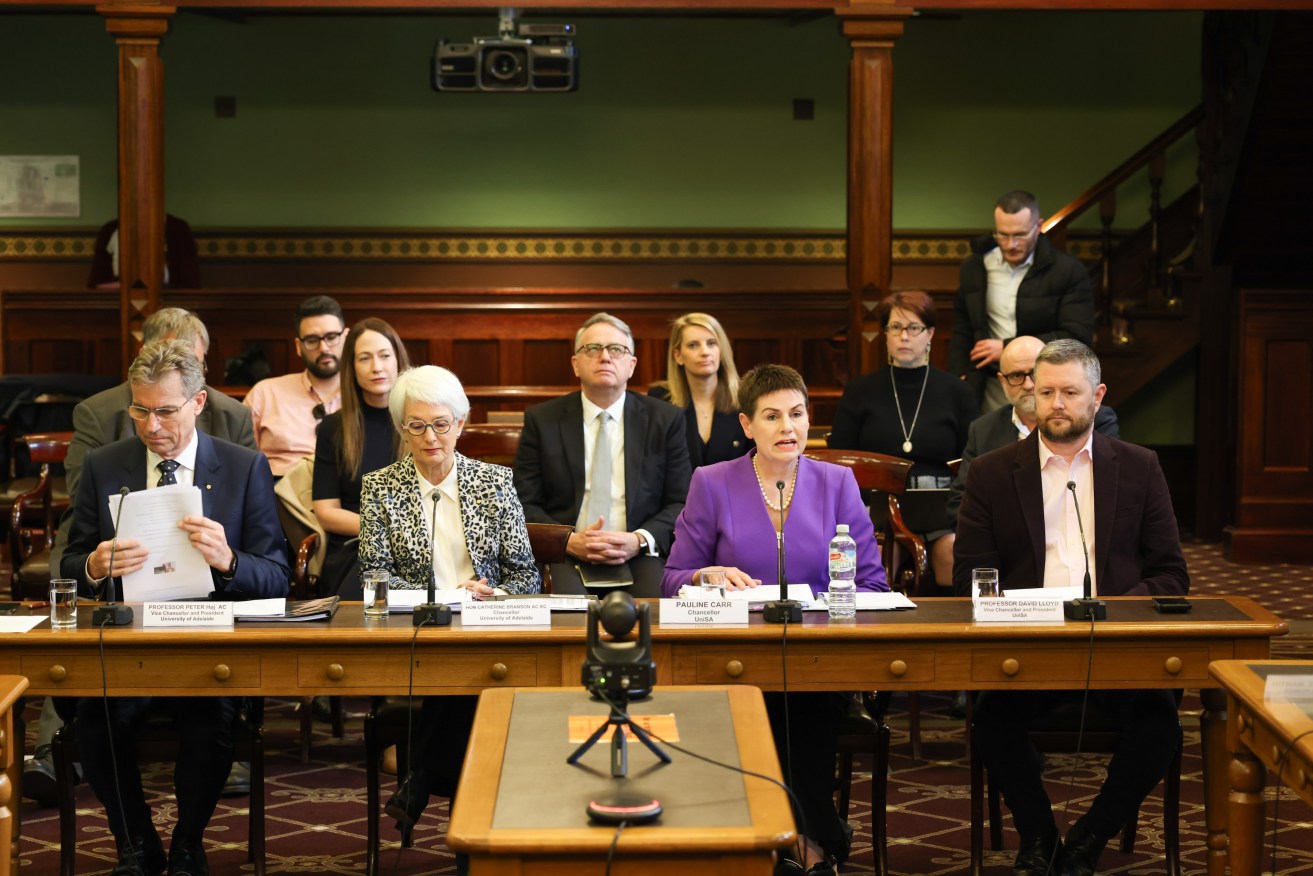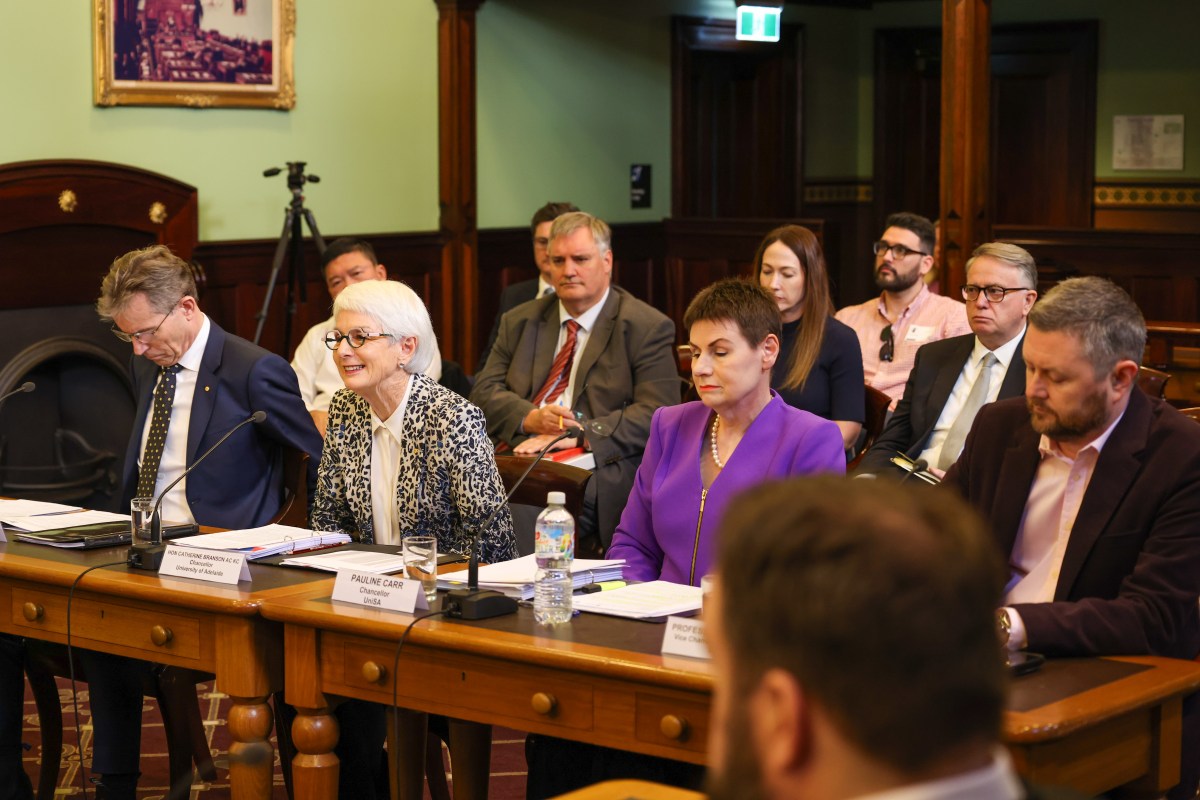Uni chiefs dismiss ex-VC merger concerns
Two university vice-chancellors have played down a former University of Adelaide head’s call to delay a planned merger, saying he was “not as qualified as we are”.


(L-R) University of Adelaide vice-chancellor Peter Høj and chancellor Catherine Branson with UniSA chancellor Pauline Carr and vice-chancellor David Lloyd at the university merger committee inquiry on Tuesday. Photo: Tony Lewis/Indaily
Former University of Adelaide vice-chancellor Warren Bebbington gave evidence last week to the parliamentary inquiry into the establishment of Adelaide University, telling MPs the merger was a “solution to a problem South Australia doesn’t have” and risks creating a “lumbering dinosaur dependent on an outdated business model”.
Bebbington, who was Adelaide’s vice-chancellor from 2012 to 2017, said the merger was pre-empting “far-reaching” national reforms to higher education that will stem from the Australian Universities Accord next year.
He argued that most states will use the Accord as an opportunity to add smaller universities and “little study centres” and creating a merged university “giant” would be “quite out of step with the changed university environment in Australia”.
But current UniSA vice-chancellor David Lloyd and his University of Adelaide counterpart Peter Høj hit back at Bebbington this week, arguing creating a university of scale aligns with the objectives of the Accord panel.
Appearing before the parliamentary inquiry on Tuesday, Lloyd said it was “highly unlikely” the Accord will cause a “seismic shift” in short term university funding arrangements.
“I think Professor Bebbington is probably further removed from the Accord than Peter or myself will be as vice-chancellors of the universities and certainly myself as the chair of Universities Australia,” Lloyd said.
“In every dialogue and every instance we’ve had engaged with the (Accord) panel… it’s very clear to us that the objectives we have are wholly aligned to the Accord process.
“The objectives we have around broadening participation and access to education is aligned to the Accord process.
“And in no instance has any member of the Accord panel, or indeed (federal education minister Jason) Clare, raised any concerns about what we’re trying to achieve.
“In fact, the Minster has written a letter of support directly to us, which recognises our alignment to what the outcomes will be.”
The Accord’s final report is not due until December and any legislative reforms stemming from the review will not come before federal parliament until 2024.
In its July interim report, the Accord panel, chaired by another former University of Adelaide vice-chancellor, Mary O’Kane, described the SA university merger as an “interesting opportunity” for reform but also warned that pursuing economies of scale is not “necessarily in line with the needs of students”.
The report also stated that Australia’s higher education system “would benefit from having a wider range of complementary institutions differentiated by their unique missions”.
But Lloyd told the committee that there is “no preclusion around scale in the Accord”.
“There is nothing that says that big is better or small is better – it is all about mission and about mission-based compact activities,” Lloyd said.
“And in the formulation of the mission for the future institution, we were very clear in our deliberation when we met with the Accord panel… that we were trying to orient this future institution to be differentiated in terms of its mission for South Australia, but also in terms of its delivery of education at scale on a national level.”
Høj added that creating a large institution is not mutually exclusive with contemplating whether other smaller, specialist institions should be added to Australia’s higher education mix.
The University of Adelaide vice-chancellor also rejected arguments put forward by Bebbington and others to the inquiry that creating a larger university will diminish student experience, highlighting his record as vice-chancellor of the University of Queensland.
“I am Australia’s longest serving vice-chancellor, having run three universities of very different nature, and David has had a very long tenure at the University of South Australia,” Høj said.
“We were asked before whether a former vice-chancellor of one of our institutions was qualified to make the calls that he made in this room.
“He might well be, but not as qualified as we are.

University leadership giving evidence before the committee inquiry on Tuesday. Photo: Tony Lewis/InDaily
“(Bebbington) served nearly five years as vice-chancellor and it was said that a large university would be, I think, a ‘lumbering dinosaur’ (and) implied that the student experience couldn’t be good.
“I think it is true to say that if you get very big you can’t afford to divest from the student experience.
“But University of Queensland clearly shows that at almost two and a half times the size of the University of Adelaide, you can consistently have better student experience than Adelaide University ever achieved under Professor Bebbington.
“It is about the values you set for the institutions and the ambitions; it is not about the size – it is the investment decisions you make.”
On Tuesday, the University of Adelaide dropped in the Academic Ranking of World Universities from the 101-150 bracket to the 151-200 bracket.
UniSA remains ranked within the 501-600 bracket.
The universities’ vision statement for the new Adelaide University targets being recognised among the world’s top 100 universities on an “ongoing and sustainable basis”.




